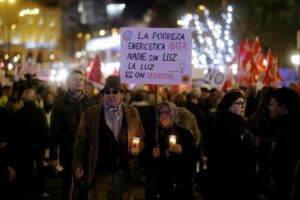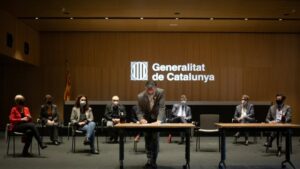On March 29th the Generalitat of Catalonia and the electricity company Endesa reached an agreement1 —qualified as “historic” by social organizations— that will relieve 73% of the accumulated debt of the most vulnerable families between 2015 and 20202 and the rest of the debt will be assumed by the autonomous administration.
This agreement has only beenpossible thanks to the legal framework that exists in Catalonia: The agreement between Endesa and the Generalitat is framed within Law 24/2015on urgent measures to face the emergency in the field of housing and energy poverty3. This law was promoted by civil society thanks to organizations such as the Alliance against Energy Poverty (APE) or the Platform for People Affected by Mortgages (PAH)4.
In addition the agreement includes the creation of a Solidarity Assistance Fund that will enable affected people to pay considerably lessfor their bills. This will avoid the generation of new debts in the future. Endesa and the Administrations5 will contribute 50% to this fund. The APE also assumes that the Generalitat will reach identical agreements with the other two large electricity companies: Naturgy and Iberdrola.
At this time in the rest of the Spanish stateafter the start of the pandemic the central government prohibited supply cuts to the most vulnerable families6 which does not prevent debt from accumulating. This is combined with the social bonus that anyone in a vulnerable situation could request7.
The APE considers that this is not an adequate solution and for this reason they have started a national campaign:“Regulation should be done at the state level, forcing companies to make social rates that can even reach a 100% discount[…] and let the companies assume the discounts. They are companies that manage basic needs and do a business with energy, so they should be the ones who bear the costs of those who cannot pay”8, defends spokeswoman María Campuzano.
In this line both the Ministry of Ecological Transition and the regional and local administrations should contribute to reducing electricity consumption by taking measures such as the conditioning of the homes of the most vulnerable families. This will have to benefits: Fighting against climate change and reducing the electricity and gas consumption of the most vulnerable families. Of course this episode opens the door to reduce the power of electricity and to protect the most vulnerable in energy matters.
1 https://dogc.gencat.cat/es/document-del-dogc/index.html?documentId=897438 2 https://pobresaenergetica.es/es/2021/03/29/firmado-el-convenio-con-endesa-que-liberara-a-35-000-familias-de-su-deuda/ 3 https://www.boe.es/boe/dias/2015/09/09/pdfs/BOE-A-2015-9725.pdf 4 https://www.europarl.europa.eu/doceo/document//E-8-2016-003799_ES.html 5 https://dogc.gencat.cat/es/document-del-dogc/index.html?documentId=897465 6 https://www.rtve.es/noticias/20201222/gobierno-aprobara-este-martes-prohibir-desahucios-cortes-suministros-hasta-fin-del-estado-alarma/2060811.shtml 7 https://www.bonosocial.gob.es/ 8 https://pobresaenergetica.es/es/2021/02/12/la-sociedad-civil-exigimos-en-una-reunion-con-el-ministro-de-consumo-alberto-garzon-medidas-para-proteger-a-las-familias-que-sufren-pobreza-energetica/
Become Interest


One Response
THE WAVE OF HATE THAT DOESN'T STOP GROWING - IN ACTION)))
[…] AGREEMENT BETWEEN ENDESA AND THE GOVERNMENT OF CATALONIA TO CONDONATE DEBT TO THE MOST VULNERABLE Handbook for Nonviolent Campaigns SIGN: FOR A JUST EXIT FROM THIS CRISIS All Articles, Highlighted, Spread […]